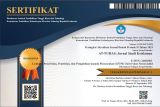NALAR KRITIS TERHADAP KONSEP NAFSU AL-GHAZALI
(1) * Muhammad Fahmi
 (Universitas Islam Negeri Sunan Ampel Surabaya)
(Universitas Islam Negeri Sunan Ampel Surabaya)
(*) Corresponding Author
AbstractThe discussion of nafs (desire) is not being easy, since it is one of abstract activator of human action. Since then there are lots of attention given by Muslim scholars or scientists on the relationship between nafs and human being. Imam Al-Ghazali, the 12th century outstanding ulama who had considerable works on Islam and philosophy, attempted to elaborate the concept of nafs, and divided it into three dimensions: al-muthmainnah, al-lawwâmah, and al-ammârah. Al-Ghazali inserted al-muthamainnah into the good desire (al-mahmûdah), while al-lawwâmah and al-ammârah into the bad desire (al-su’). He classified these nafs into certain criterion, and this study attempts to critically analyze this classification and to throughly reflect it under some considerations. In some extents, Al-Ghazali’s conception of nafs should be criticized and reinterpreted in the contemporary era. |
Full Text: PDF
Refbacks
- There are currently no refbacks.
Copyright (c) 2018 Muhammad Fahmi
This journal is licensed under a
Creative Commons Attribution-ShareAlike 4.0 International License





.png)






